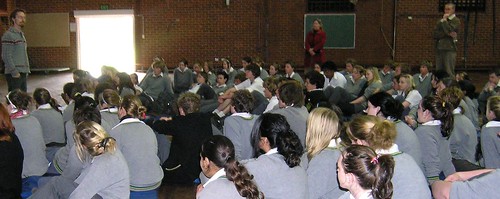
Jarrod McKenna’s Wednesday’s with Gandhi:

“Jesus expressed, as no other could, the spirit and the will of God. It is in this sense that I see him and recognise him as the Son of God.”
–Gandhi, (October 1941) from “Mohandas Gandhi: Essential Writings” by John Dear, p. 79
How does Gandhi’s understanding of ‘Son of God’ sit with you?
I don’t think Gandhi was talking about the “hypostatic union” of the Father and the Son. I don’t think Gandhi had in mind the fourth Ecumenical Council in Chalcedon considering the two natures of the Son of God. Nor did Gandhi have the Sixth Ecumenical Council in Constantinople and it’s discussion of, not just the two natures, but the two wills of the Son of God.
But in fairness to Gandhi, nor does the average evangelical Christian. While I don’t want to take away from any of the important spiritual lessons that can be learnt from studying the “Councils”, I’d like to suggest it’d be fruitful to consider what another non-Christian probably meant by “Son of God” and what the Apostle Paul meant in context.
The Unnamed Soldier
We don’t know his name. And there is little recorded about him. What we do know: He was a solider who’s job declared “good news”. The Good News of the ‘Son of God’ bringing salvation and justice to the world because he is now Lord of the whole world and calls for our allegiance. I know what your thinking,
“Jarrod, I thought you said he wasn’t a Christian?”
He’s not.

That’s the language used by the fastest growing religion in Jesus’ day, the Cult of Caesar. The ‘Cult of Caesar’ announced Caesar as Divine and provided the spirituality for the Empire’s invasion, colonisation, oppression and continual domination. This unnamed soldiers job was his spiritual act of worship, to oversee the brutal and public humiliation of those who would challenge the hegemonic control of the world by it’s true Lord and Son of God, Caesar, the Roman Emperor. The Empire did this through Caesar’s saving methods, means, politics, ethics and spirituality; VIOLENCE. In particular for this centurion, his job was overseeing the violence of crucifixion which made a spectacle of would be revolutionaries that would challenge Caesar as Divine Ruler of the world.
Yet, one Friday the politics, ethics, spirituality and allegiance of this centurion of the oppressive Empire did a radical life changing back-flip. As Mark Gospel records it chapter 15:37-39:
With a loud cry, Jesus breathed his last.
The curtain of the temple was torn in two from top to bottom.
And when the centurion, who stood there in front of Jesus, heard his cry and saw how he died, he said, “Surely this man was the Son of God!”
“SON OF GOD?!” These words are not in the mouth of a Jew referring to the rich Jewish imagination associated with this term; the real King of Israel, the real liberating anointed leader (messiah). These words are instead in the mouth of someone who as a Roman Centurion knew the term “Son of God” to refer to his violent political leader, Caesar.
Yet, after maybe watching the death of thousands via crucifixion, something about the cry and the way this nonviolent messiah died, brought him to a conclusion that still threatens the heart of violent empires everywhere (including Burma this week). In this bloodied dying revolutionary he had seen and heard real power. Real leadership. Real sovereignty. Real divinity. The real ruler. The ‘Son of God’ that instead of ruling with violence would expose the “comic backfire” of violence and the structures which have institutionalised it’s reign, making a spectacle of it and triumphing over it “by the cross.” (Colossians 2:15)

As N.T. Wright has said,
“A close comparison of the “good news” of the Caesar cult with Paul’s words shows that Romans is, among other things, a deliberate parody of the [violent] pagan message. Paul’s readers in Rome must have understood this, and he must have intended them to. Paul’s ideas do not derive from the Caesar cult, as some have suggested; they confront it.”
The Apostle Paul is not, as some liberal theologians have argued, (and sadder still, some evangelicals practice), lifting his ideas from the cult of Caesar worship in an act of political vasectomy to neutralise and hellenise a Judaism that would bow the knee to the Empire’s violent agenda. Instead the Apostle Paul is practicing the nonviolent ‘spiritual jujitsu’, (to nick Wink’s term), that Jesus taught to subvert the language Empire (and it’s spirituality of domination and violence) to expose and undermine it.
 The early church, filled with the Holy Spirit, did just that and it often cost them there lives. Much like the unarmed actions of the Buddhist monks in Burma this week, the early church showed a fearlessness in the face of the rebellious principalities and powers. Yet unlike the monks and their brave actions (which I admire deeply) where not simply fueled by the desperation of the situation but by the resurrection of the Son of God; the dawning of God’s nonviolent dream for creation. Unquestionably they understood the cross to be what God has done for us, empowering us to “put away the sword” and to take up the cross as our way of defeating evil (as seen in the early churches refusal to fight wars for first three centuries of Christianity).
The early church, filled with the Holy Spirit, did just that and it often cost them there lives. Much like the unarmed actions of the Buddhist monks in Burma this week, the early church showed a fearlessness in the face of the rebellious principalities and powers. Yet unlike the monks and their brave actions (which I admire deeply) where not simply fueled by the desperation of the situation but by the resurrection of the Son of God; the dawning of God’s nonviolent dream for creation. Unquestionably they understood the cross to be what God has done for us, empowering us to “put away the sword” and to take up the cross as our way of defeating evil (as seen in the early churches refusal to fight wars for first three centuries of Christianity).
Tragically today we even have church leaders who accuse those who challenge the hijacking of Christianity in service the diabolical exploitation of God’s good earth and the poor as ‘twisting the Scriptures’. That accuse those who are calling the church to obey Jesus Christ and therefore love our enemies like he did, (through the way of costly love NOT the way of ‘smart bombs’ and preemptive strikes) of distorting Jesus for our own agenda.
I wonder if the challenge of a pagan solider at the cross of Jesus, the courageous unarmed Buddhist monks in Burma and the context of the Apostle Paul’s writing, will be enough for us to see how often we have made “Son of God” mean less than, (as Gandhiji put it), “Jesus expressed, as no other could, the spirit and the will of God”. More than that, I wonder if the Scriptures will be enough for Christians to believe like the early Church did that Jesus is not less than the Messiah, God incarnate, God revealed fully to be Love.
And calls us to live in ways that reflect such a love as revealed in Jesus.
here is one small way you can support the Burmese Protestors





 🙂
🙂








 That’s the language used by the fastest growing religion in Jesus’ day, the Cult of Caesar. The ‘Cult of Caesar’ announced Caesar as Divine and provided the spirituality for the Empire’s invasion, colonisation, oppression and continual domination. This unnamed soldiers job was his spiritual act of worship, to oversee the brutal and public humiliation of those who would challenge the hegemonic control of the world by it’s true Lord and Son of God, Caesar, the Roman Emperor. The Empire did this through Caesar’s saving methods, means, politics, ethics and spirituality; VIOLENCE. In particular for this centurion, his job was overseeing the violence of crucifixion which made a spectacle of would be revolutionaries that would challenge Caesar as Divine Ruler of the world.
That’s the language used by the fastest growing religion in Jesus’ day, the Cult of Caesar. The ‘Cult of Caesar’ announced Caesar as Divine and provided the spirituality for the Empire’s invasion, colonisation, oppression and continual domination. This unnamed soldiers job was his spiritual act of worship, to oversee the brutal and public humiliation of those who would challenge the hegemonic control of the world by it’s true Lord and Son of God, Caesar, the Roman Emperor. The Empire did this through Caesar’s saving methods, means, politics, ethics and spirituality; VIOLENCE. In particular for this centurion, his job was overseeing the violence of crucifixion which made a spectacle of would be revolutionaries that would challenge Caesar as Divine Ruler of the world.
 As N.T. Wright has said,
As N.T. Wright has said,
 The early church, filled with the Holy Spirit, did just that and it often cost them there lives. Much like the unarmed actions of the Buddhist monks in Burma this week, the early church showed a fearlessness in the face of the rebellious principalities and powers. Yet unlike the monks and their brave actions (which I admire deeply) where not simply fueled by the desperation of the situation but by the resurrection of the Son of God; the dawning of God’s nonviolent dream for creation. Unquestionably they understood the cross to be what God has done for us, empowering us to “put away the sword” and to take up the cross as our way of defeating evil (as seen in the early churches refusal to fight wars for first three centuries of Christianity).
The early church, filled with the Holy Spirit, did just that and it often cost them there lives. Much like the unarmed actions of the Buddhist monks in Burma this week, the early church showed a fearlessness in the face of the rebellious principalities and powers. Yet unlike the monks and their brave actions (which I admire deeply) where not simply fueled by the desperation of the situation but by the resurrection of the Son of God; the dawning of God’s nonviolent dream for creation. Unquestionably they understood the cross to be what God has done for us, empowering us to “put away the sword” and to take up the cross as our way of defeating evil (as seen in the early churches refusal to fight wars for first three centuries of Christianity). Today in the mail I received an opportunity to bless this brother back. His publisher has sent me his newest book “Everything Must Change: Jesus, Global Crises, and a Revolution of Hope” to review before it’s released later this year.
Today in the mail I received an opportunity to bless this brother back. His publisher has sent me his newest book “Everything Must Change: Jesus, Global Crises, and a Revolution of Hope” to review before it’s released later this year. “In my travels around the world, I see a lot to inspire cynicism -including a lot of shabby religious stuff I’d rather not even give examples of. But I also meet people who inspire hope and courage in me -emerging young leaders who “get” Jesus’ message of the kingdom of God, and who are living it and giving it away. They see the integral nature of mission – that it brings together God and humanity, humanity and creation, grace and nature, contemplation and action, evangelism and social justice, faith and politics, the making of disciples and the making of peace.
“In my travels around the world, I see a lot to inspire cynicism -including a lot of shabby religious stuff I’d rather not even give examples of. But I also meet people who inspire hope and courage in me -emerging young leaders who “get” Jesus’ message of the kingdom of God, and who are living it and giving it away. They see the integral nature of mission – that it brings together God and humanity, humanity and creation, grace and nature, contemplation and action, evangelism and social justice, faith and politics, the making of disciples and the making of peace. 




